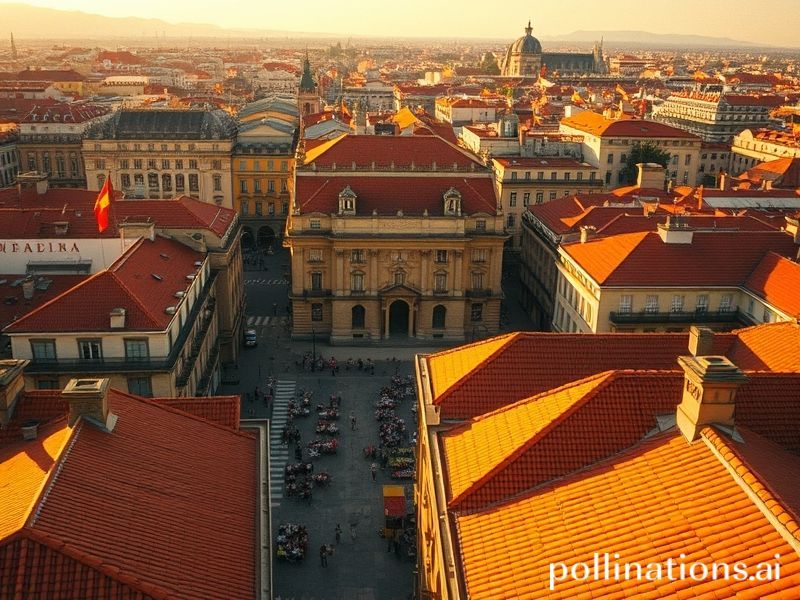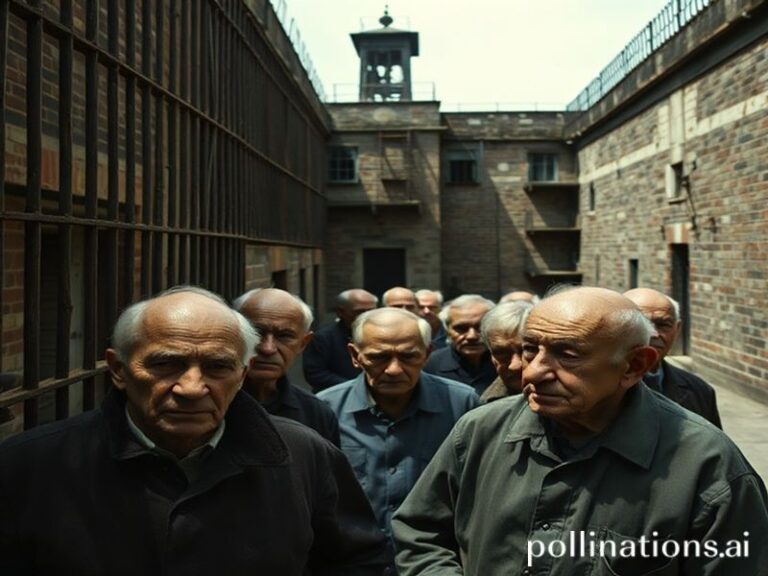Spain: The Nonchalant Laboratory Where Europe Tests Its Next Existential Crisis
Madrid, 3 a.m. local time—though the hour is largely theoretical in a country where dinner starts when most Scandinavians are already in REM sleep. Spain, that sun-bleached amphitheater of ancient grudges and modern appetites, is once again the place where Europe tests whether optimism can be reverse-engineered from a hangover. While the rest of the continent barricades itself against inflation, immigration, and the nagging suspicion that liberal democracy was just a long-running Netflix pilot, Spain strolls in late, orders another round, and somehow convinces Brussels to pick up the tab.
Let us zoom out, way out. From a satellite’s cold eye, Spain looks like a crimson cape fluttering in front of a very large geopolitical bull. To the north, France is busy re-nationalizing its debt; to the south, Morocco mines the world’s last unquarried phosphate like a teenager looting a vending machine. Across the Atlantic, Washington keeps forgetting Spanish is the second language of its own future electorate, while Beijing quietly buys up Barcelona’s 5G networks the way one collects vintage wines—more for the label than the taste. Spain, meanwhile, is trying to remember whether it left the oven on in 2008.
The numbers say it’s doing better than it has any right to. GDP growth of 2.4%—the envy of a eurozone that’s basically a support group for German export trauma. Tourist arrivals have clawed back to pre-pandemic highs; apparently nothing says “post-Covid resilience” like a Brit vomiting paella into the Balearic Sea. Renewable energy now powers more than half the grid, which is excellent news for the planet and slightly worse news for the coal towns whose last economic plan involved selling asthmatic nostalgia to German filmmakers.
Yet beneath the glossy macro headlines lies a country still negotiating with its ghosts. There’s the literal kind—mass graves from the Civil War that Twitter now calls “unmarked content.” There’s the fiscal kind—phantom mortgages still rattling chains inside Cajas that were technically resolved a decade ago, unless you ask any homeowner under 40. And there’s the constitutional kind: Catalonia’s independence itch flares up every few seasons like herpes, treated by Madrid with the same blend of denial and expensive ointment.
Globally, Spain matters precisely because it refuses to matter the way textbooks expect. It has no nukes, no permanent UN Security Council seat, and no immediate plans to invade anything more controversial than a British beach resort. Instead, it exports subtler toxins: the idea that you can run a modern welfare state on jamón and irony; the demonstration that coalition governments can survive on nothing but shared WhatsApp memes; the reminder that austerity is just puritan cosplay if you still get siestas. In a world addicted to grand strategy and hyperbole, Spain’s low-stakes competence is almost pornographic.
Watch the ripple effects. Latin America, nursing its own Iberian hangover, looks to Spain to see how badly the family silver can be fenced before someone notices. North Africa studies Spanish agricultural tech the way a younger sibling borrows an ID—hoping to sneak into the EU party before the bouncers wake up. Even the United States, normally allergic to second languages, now courts Spanish-speaking voters with the tenderness of a drunk tourist ordering “una mas cerveza, por favor.” The Spanish language itself has become the world’s most successful open-source software, forked and patched from Buenos Aires to Los Angeles, occasionally crashing in Madrid but always rebooting.
So what happens next? The smart money says Spain will keep muddling through, the way it has since the Romans overpaid for beachfront villas. A heat wave will melt another glacier of German retirees; Podemos and Vox will scream at each other on prime-time TV while quietly agreeing to subsidize the same olive conglomerates; and somewhere in Galicia, a grandmother will mutter that Franco at least kept the trains punctual—ignoring the fact that he mostly did so by not building any.
And the rest of us, nursing our own late-capitalist vertigo, will keep booking long weekends in Seville, reassuring ourselves that if Spain can still function on this little sleep and this much history, maybe there’s hope for the rest of us. Or at least a decent glass of tempranillo while we wait for the end.







